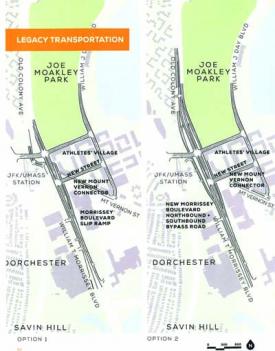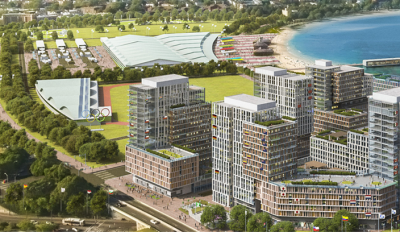June 28, 2015

A new rendering depicts what the Olympic Athletes' Village might look like during the 2024 Summer Games. Image courtesy Boston 2024
If Boston wins its bid to host the 2024 Summer Olympic Games, a $2.8 billion, privately-built Athletes Village will rise from Columbia Point, coupled with publicly-funded fixes for Kosciuszko Circle and the JFK/UMass MBTA Station.
The Athletes Village plan is a key pillar of Boston 2024’s plan to host the Olympics in Summer 2024. Today, the private organization behind the bid to host the Olympics is rolling out its latest iteration of how the city and surrounding areas would put on the Games at a press conference at the Boston Convention and Exhibition Center.
Boston 2024’s “2.0 Athletes Village” will be a $2.8 billion, 4 million-square foot enterprise, bankrolled by a so-called “master developer” that would purchase the parcels at-cost and develop them to Olympic specifications, said Boston 2024 CEO Rich Davey in an interview with the Reporter.
All of this — of course— hinges on Boston actually winning the bid for the 2024 Summer Games. Davey said a Request for Qualifications for a master developer would be issued “early next year” with an Request for Proposals process kicked off “basically the moment we find out if we win the Games” in September 2017. The master developer then would be selected through a “competitive” public process with the city and Boston Redevelopment Authority, with construction expected to begin in 2020. The Reporter first reported details of the master developer concept in a story earlier this month.
 Olympic Village plans envision replacing Kosciuszko Circle with new road systemFixes to Kosciuszko Circle and JFK/UMass Station would be pursued through a new transportation bond bill secured from the state legislature, Davey said. The Dorchester and South Boston delegation at the State House “would have to lead” the effort to secure funding for the bonds, Davey said, adding that the delegation was briefed on the proposals on Friday and “they were happy with the proposed transportation improvements.”
Olympic Village plans envision replacing Kosciuszko Circle with new road systemFixes to Kosciuszko Circle and JFK/UMass Station would be pursued through a new transportation bond bill secured from the state legislature, Davey said. The Dorchester and South Boston delegation at the State House “would have to lead” the effort to secure funding for the bonds, Davey said, adding that the delegation was briefed on the proposals on Friday and “they were happy with the proposed transportation improvements.”
The existing traffic rotary at Kosciuszko Circle would be completely eliminated and replaced with a new four-way intersection. The road improvements could cost as much as $160 million. The new Boston 2024 proposal envisions two potential re-designs to the road system, including one design that would create a north-south bypass road to parallel Morrissey Boulevard.
Davey said that the design elements for the road system are based on plans outlined by a BRA-supervised master plan that was created by a team of civic leaders several years ago.
“We heard from the neighborhood and electeds that a consensus had already been derived and to make sure to use it as part of our work,” said Davey.
JFK/UMass would see an upgraded station with an improved accessibility, better access between the areas separated by the Expressway, and upgrades for bus mustering. Davey said he estimates that the rehab at the Red Line and commuter rail hub would cost about $60 million.
“We’re not asking for something that would be nice to have. We’re asking for something that the community has needed for at least a decade,” Davey said. Boston 2024 does not have a timeline for the bond bill, but Davey said he expects funds would be identified in the next available bond bill— which is still two years away.
The Athletes Village developments would be built piecemeal around existing and proposed developments, including the new Boston Teachers Union, an expanded DoubleTree Hotel, and the proposed six-story University Place development adjacent to the existing Bayside Office Center.
“All are very open to our plans, [they] have all seen them,” Davey said of the current stakeholders on Columbia Point. “Of course, the devil’s in the details.” The Dorchester Reporter previously reported that in Boston 2024’s first iteration of the plan, key landowners and stakeholders had not been consulted about plans to use Columbia Point land for the Games. Since then, things have changed.
“All have expressed willingness to develop plans and negotiate,” Davey said. “They see that this could be the proverbial win-win-win.”
The $2.8 billion sum itemized on Monday includes $211 million for land acquisition and infrastructure within the village, with $2.067 billion for construction, $330 million for “soft costs” and $60 million for contingency. Davey said he expects “hundreds” of construction jobs will be created before the Games.
“The overall insurance program will have a master developer assume the risk,” Davey said. “That’s why we like the master developer approach.”
The plan could also include surety bonds and a capital replacement insurance program, “ensuring an insurance company will step in if financing falls apart,” he added.
The new Athletes Village also calls for a smaller footprint than the previous version, staying largely limited to the start of Columbia Point at Mt. Vernon Street and Morrissey Boulevard and working northeast up Mt. Vernon Street. The development bleeds north toward Carson Beach and Moakley Park. The new plan also strikes a proposed Expressway on-ramp that would have cut through Savin Hill. Another major alteration in the new draft: The Santander Bank property at 2 Morrissey Blvd is no longer included in the Village footprint. Davey said that acquiring the bank's sprawling operations center would have been cost prohibitive.
“The legacy is to leave behind a new neighborhood,” Davey said. That neighborhood is comprised of 4,000 units of housing, 3,000 of which are mixed income and multi-generational, with another 500 units of elderly housing–something locals have specifically called for after the first plan was vetted with the community. It will also include a 2,700 square-foot innovation center with artisanal workshop space. The development will also be “resilient,” Davey said, built in line with flooding and other natural disaster-specific precautions. The plan will also create 450 permanent jobs after the Games between retail and property management positions.
The current plan does not call for modular housing to be relocated throughout the city after the Games, which was a key facet in the first Athletes Village proposal delivered to the US Olympic Committee in December.
Another 2,700 units would be created as dorms for UMass Boston students. As detailed in the Columbia Point and university master plans, UMass Boston is currently working to build out housing for its students. Davey said it was possible the same developer chosen this summer to build the first round of dorms for UMass Boston could be the same master developer selected for the Athletes Village, but all would be ironed out in the “competitive” public process to select the developer.
The university is not currently engaged as a site for any actual competition, but according to Davey, that could change. UMass Boston is key partner in the Athletes Village concept also because since the university controls the pivotal Bayside Expo Center parcel, which is in use in the latest renderings.
“This is not the end of the conversation,” said Davey. “We have a number of events that do not have venues yet, aquatics in particular. Right now, the aquatics facility would be built as a temporary venue and we see that as a missed opportunity. We think there may be a way to leave behind a permanent pool for a university or a neighborhood.”
 Closer look at Moakley Park, Carson Beach use in Olympics Bid 2.0: Image courtesy Boston 2024One element of the Athletes’ Village plan that is just now coming into sharper focus in the 2.0 document are plans to utilize most of South Boston’s Moakley Park for facilities related to the Athletes’ Village. A rendering supplied to the Reporter by Boston 2024 shows multiple temporary structures rising from what are now playing fields in the 62-acre, city-owned park.
Closer look at Moakley Park, Carson Beach use in Olympics Bid 2.0: Image courtesy Boston 2024One element of the Athletes’ Village plan that is just now coming into sharper focus in the 2.0 document are plans to utilize most of South Boston’s Moakley Park for facilities related to the Athletes’ Village. A rendering supplied to the Reporter by Boston 2024 shows multiple temporary structures rising from what are now playing fields in the 62-acre, city-owned park.
“We are proposing to use Moakley in part temporarily for the athletes and we’ll be investing the northernmost piece of the park,” said Davey. “We think that there are some improvements that could be made there both before and after the games.”
To fund the creation of the $2.8 billion neighborhood, Davey said a tax agreement would be negotiated between the city and the successful developer. “We’re not contemplating bonds, just a straight up tax arrangement with whoever the developer is and the city,” Davey said, adding that as of Sunday night, the city is not on board with the tax agreement plan.
“Over 9 years out, I am satisfied with where we are,” Davey said Sunday night. “I have no doubt that this won’t answer every question. This is 2.0, this is not the end of the conversation.”
Boston 2024 and the city of Boston are continuing to host community meetings on the proposed plans. The city of Boston’s next meeting is on Tuesday night at Jamaica Plain’s English High School at 6:30 p.m. Boston 2024 is traveling to Quincy for a public meeting to vet the proposed beach volleyball venue at Squantum Point Park on July 9.
Villages:
Topics:



